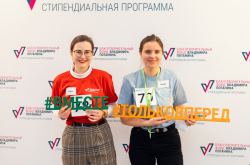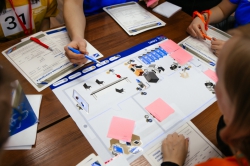Keep track of grant competitions
The Potanin Scholarship Program isn’t the only opportunity for university lecturers to get additional funding for their professional activities. Higher education institutions regularly publish information on grant competitions (at ITMO, this is done through the university’s intranet system ISU). You can also keep up with scholarship open calls on other universities’ websites. There are many competitions out there, and it is not always that one university’s staff can find and list all the opportunities available.
Another way of learning about contests is subscribing to the aggregators of grant opportunities for teaching and research staff and keep tabs on international grant databases. And don’t forget to check with your colleagues: they are a very important information source.
Don’t put off applying for too long (an obvious piece of advice that is still worth mentioning). Submitting your documents at the eleventh hour isn’t the best idea, even if deadlines are your only motivation.
As soon as you found out about a competition…
Look into its terms and conditions: do you fit into the age limit, or maybe it is your students who can apply? Sometimes you’re required to apply as a team where 50% or more are young researchers. Find out the deadline. Important: check up on what documents to submit and who has to sign them. Remember that signing the documents takes time, and bosses don’t like to autograph something in a rush. You’ll see the signature requirements when you open the whole application text. Factor in a week on getting all the signatures right (you can work on your application while waiting).

Keep the application documents set in your computer on all times
This will come in handy should a new grant contest come out of the blue. Among the documents to always have on yourself is a CV: with a completed CV at hand, you don’t have to analyze your entire career and struggle trying to put it on paper when the push comes to shove. It’s no secret that people working in academia (much as in business) aren’t that great with updating their resume, so make sure you keep things current; that will save you time when preparing for a new application. Pick and choose from your full work experience list to adapt the CV to a specific grant. For example, the Vladimir Potanin Foundation requests that you expand on your participation in three conferences most relevant to the theme of your application.
You can compose a CV in advance with the help of CV builders available online, but don’t rely on the standard HeadHunter-style format too much when applying for an academic contest. It’ll be better if you describe your experience in an explanatory, comprehensive way. You may want to have not one, but several resumes at your elbow: some are more suitable for international academic activities, others for grant competitions.
The set can also include project pitches: sketches and prototypes which you work on in parallel to your main professional activities. Projects like these can be listed as additional activities, so it’s important to document your ideas. A grant application implies that you can offer something novel (a project which you thought of but didn’t actualize) or something that you have already started working on, and getting that grant will motivate you to carry through with this idea and spur its development. Experienced grantees say that you’re most successful when submitting a project that already has some tangible developments like a sketch, a detailed plan, or a prototype to give the selection committee a guarantee that the project will be a 100 % brought to fruition. Apart from new ideas, be sure to keep record of the projects you completed to then mention them in your application. Think about how you could present your projects so that they fit into current trends in the sphere of education.

Another must-have for your documents set are partner letter templates from organizations (specialized associations, companies, 5-100 Project universities and the like), and for your list of contacts, phone numbers and emails of organization representatives you can approach to vouch for you before the grant committee. In case of the looming deadline, you need to have a third-party partner who will be willing to sign a recommendation letter, which is a prerequisite in many a grant competition. Important: note that in the majority of cases, you have to write a recommendation letter yourself (the finished result can be then sent to the signing party for approval).
Motivation letter forms a key part of your grant application. Save the best motivation letters you find into a separate folder: they will help you in writing your own. Often it is your motivation letter that the competition organizers pay the most attention to. Motivation letter format is different for each contest: in some of them, you need to focus on your leadership skills (this is the case with the Potanin Scholarship), others require you to highlight your research approach. Analyzing your projects in terms of accomplishments and being able to present them to your best advantage are the skills you need for a successful motivation letter. Forget impostor syndrome and write freely about your experience that taught you something valuable. The things you decide to write about don’t necessarily have to be obvious, but they must be relevant. Don’t complain about anything in your motivation letter; talk about the challenges you faced and how you overcame them instead.

Oftentimes, in your motivation letter you are supposed to answer some basic questions such as describe your plans for the future or showcase your leadership skills. In this case, your company’s experience may come in handy. For example, if you work at ITMO University, you could write about the way its transformations inspired you.
Remember that there is no such thing as a perfect motivation letter. It’s all about your creativity. You can even come up with a title for your letter and structure it the way you like best.
Follow the organizers on social media
Before starting to fill in the application form, learn as much as you can about the meetings with the competition’s organizers. In St. Petersburg alone, the Vladimir Potanin Foundation has already held several onsite seminars. In addition to these seminars, you can also participate in the organization’s webinars and even get an individual consultation.
Familiarize yourself with the Foundation’s charter and its values, follow it on social media, be it Facebook, Twitter or Instagram. Try to learn more about the Foundation’s activities, as it might be useful later. For example, if you’re interested in developing your soft skills, you might consider taking part in the Foundation’s summer school focused on these skills. Find some areas of common interest with the Foundation, as to get funding, your projects have to be relevant to the organization’s goals.

Ask for information about last year’s winners.
This will help you understand what projects are successful and choose the best approach. For instance, in Potanin Foundation’s competition, you’re expected to use your creative streak. But don’t over-focus on other participants’ experience, as it might lead to lack of self-confidence.
Describe your budget planning
It’s very important to write clearly about what you’re going to spend the money on. Of course, you will still be able to make changes to your budget, but the organizers have to see what logic you’re using. Try to balance your spendings between business trips, equipment and salaries (to yourself and your employees). Don’t mention anything you think you won’t be able to make (for example, don’t write about a business trip you are not going to go on). And don’t spend all the money you get on paying salaries.
Keep it short, but not too short
Your project’s title should be catchy and concise. And it should be clear from the very start what the project is about. Don’t use abbreviations popular in the academic sphere, as there might be people among the experts who have no idea about what these words mean.

Don’t limit yourself to one field or university
When developing your project, think about concepts that will be relevant in different fields and educational institutions. For one, a board game can be a valuable tool in many areas.
Be precise when talking about the results
Use SMART approach for proposing your strategic goals, which means that your goals should be specific, measurable, relevant, and reachable in time. So if you’re expecting your audience to exceed 1,500 people, talk about the ways you’re going to achieve it. Be honest and don’t inflate your numbers.

Be accurate with your words
You can always specify in your application the exact product you’re going to produce so that your results would always meet the requirements.
Secure the backing (optional)
Try to obtain your boss’s support and mention it in your application form.
Find reliable team members and delegate responsibility
Familiarize yourself with the award criteria
Read the award criteria carefully to make sure your entry meets each of the criteria listed.





